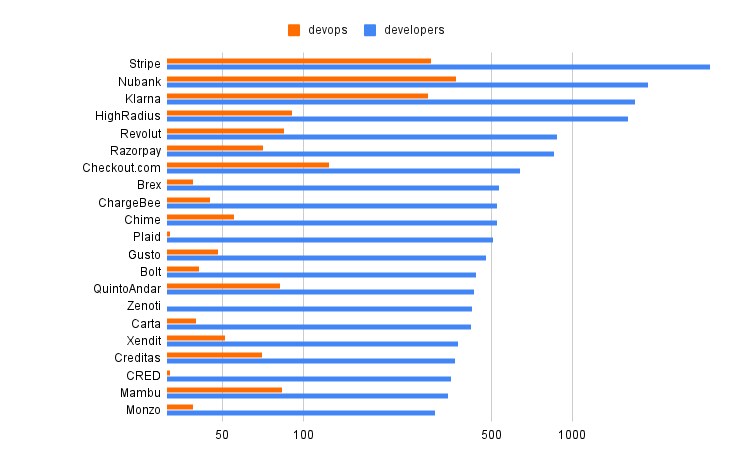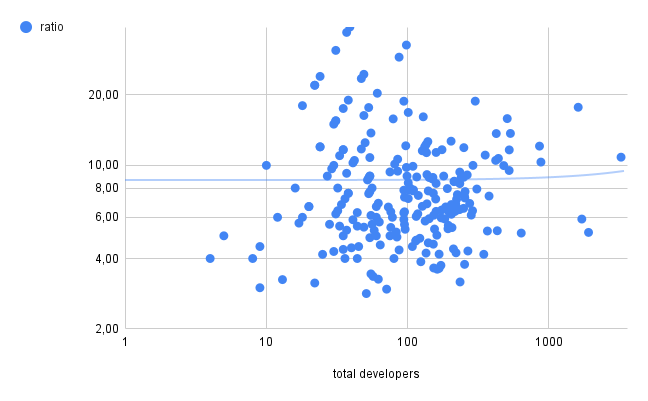3 Lessons Learned From Benchmarking DevOps Teams Of 200 Fintechs

Today I'm sharing an analysis of the sizes of DevOps teams from 200 of the top fintech companies in the world. The goal is to help size your DevOps team by benchmarking successful companies. For companies in the report, find out how you compare to peers. Do you need more people? Is your current team structure efficient?
DevOps teams have a lot of duties. Big backlogs. The question of whether the team size is right is tough to answer. Checking how successful peers are doing things is a great way to learn.
Unfortunately, there is little data available on what works or not online. Busy DevOps teams rarely find time to publish learnings. Google has the resources to write a book, but copying Google isn't always a good idea.
DevOps teams are in charge of too many things
Defining team size is hard:
- Always changing field
- Few published case studies
- Needs change by industry
- Lack of standards
I spent some time and gathered public data from Linkedin on the top Fintech companies.

Here are the 3 critical insights for Fintechs:
1. Consider Fintech-specific needs
Despite bigger requirements, Fintechs don't have more DevOps people. Audit trails, SSO, Least Access, Zero Trust, Security Certifications. These are nice to have for most companies. But they are requirements for doing business for Fintechs.

PCI is one of the security compliance certifications required for many Fintech companies to operate. Standard DevOps practices don't map directly to how to do things with these constraints.
Even so, the ratio distribution in the graph isn't even. It ranges from near 1:2 to 1:40.
2. Plan the team growth with number of developers
DevOps team sizes don't scale with engineering size. But the work does. Some of the largest engineering orgs have the smallest and biggest DevOps teams.
I have been spending a lot of time lately thinking about the human scalability of "DevOps." My takeaway after almost 10 years of working at Internet companies is that beyond a certain org size, DevOps breaks down and becomes non-functional.
— Matt Klein (@mattklein123) May 31, 2018
Matt Klein well pointed out this issue on Twitter. Matt says it is impossible to scale DevOps with engineering org size. High chances of burnout for people working on infra. Too many duties that scale proportional to engineering org size.
3. Talk to peers for improved decision
Data shows a different story from what is available online. They are good starting points, but using data is also crucial. Talk to peers and share experiences and learnings.
According to answers on Quora, the ratio of DevOps engineers to developers tends to stand around 1:10. A Gitlab blog says teams should have 3-8 people. Google SRE Book says the SRE team should start with eight people (for the SRE subset of DevOps).
Some Closing Notes
What is a DevOps team here?
I'm grouping everyone in the company working in SRE, Platform Engineering, and the related areas under the DevOps team umbrella.
The data isn't perfect
The data is an approximation based on people with experiences related to DevOps in their Linkedin profiles and work history. Some people had such experience in the past and are now SEs, which results in bad data. But some sample checks showed a good approximation.
Did I miss anything? please correct me.
This is a work in progress. I'm planning to do other analyses with the data. Feel free to point out the things you don't agree with or think are wrong.
More graphs and raw data
The graphs with all the companies ended up too big to fit in a blog post. You can download it from this like. If you want access to the raw data to run your analysis, ping me on social media. I won't share it here to avoid people using it to send spam to the list of companies.
